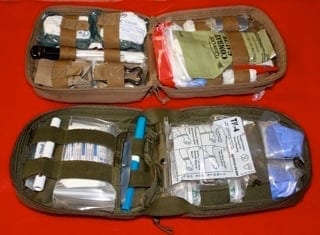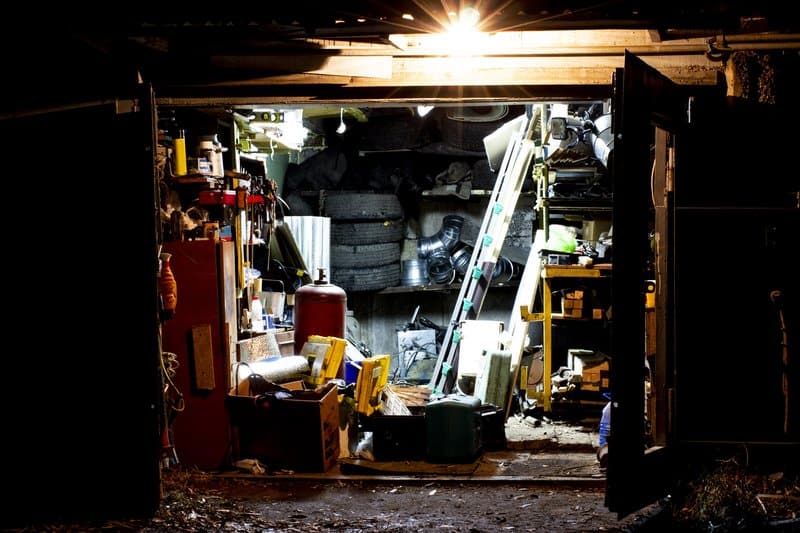Winter is a great time to get organized. While the weather is dreary or brutally cold, it gives you an excellent guilt-free opportunity to go through your preps, see what you need to replace and what you are lacking. It’s also a terrific time to declutter the house before the beautiful spring weather takes hold and it’s time to enjoy the outdoors.
This post aims to help you rotate your preps, find out what you are lacking, and get organized so you have more time to enjoy life.
Even just taking a few of the steps outlined here will save you time and money in the future.
Set aside any food within six months of expiring
One of the biggest problems a lot of people have stockpiling food is that they do not rotate their stock enough or go through their pantries to ensure they use the oldest food first.
Ideally, you would have racks and other storage setups where you could have the oldest food in the front so that you don’t have to think about rotating as much. Another option is the for anything you put into storage that you may not use within a year, write the month and date of expiration on top of the container with a Sharpie. It may seem time-consuming, but it is better than wasting time and money on food that never gets consumed by your family. You can also have totes with dates to help out with rotating if that works better for you. There is no one method that works well for everyone, so figure out a system that you think you can manage and stick to it, and you should be fine.
[caption id=“attachment_720954” align=“aligncenter” width=“800”]
Many people keep long-term storage food (canning or dehydrated) in their basements. Unfortunately, out-of-sight can mean it’s easily forgotten. Use bad weather as a great excuse to take the time to evaluate, upgrade or rotate the food you set aside for an emergency.[/caption]If you have more food that is set to expire than you or your family can eat, then donate it to a family in need, so it doesn’t just go to waste. Plenty of charity groups and food banks will take your donation and distribute it within the community.
Make a list of items to replace
It is easy to use up items you have stashed and not replace them soon enough.
At the start of the pandemic, we stocked up on a lot of household items. Some of these items you don’t use up as fast as others, so it is easy to forget to buy more over a year or two. I try to evaluate what we have on hand about every six months or so. I don’t necessarily go through everything, but I perform a brief survey and take note of items that need to be replaced so our provision and household supplies stay at the level we find acceptable.
If your list is lengthy and you are on a budget, then just try to replace items gradually over three months or whatever time frame you can manage.
Check medical kits for expired medications or damaged items
It is inevitable that you have expired medications at some point if you don’t regularly take the prescription or rotate your them. If an emergency happens, and your medicines are expired, you have take the loss because the alternative is not having medications and medical supplies.

Keep in mind that some medications are effective past the expiration date, but they will not have the potency of fresher batches. Antibiotics and pain meds don’t just stop working when they hit their expiration date, but they can be less effective. Just how less effective is impossible to tell. It depends on how meds were stored and the type of medication.
Make sure to dispose of meds correctly. Don’t leave a trash bag in your house with a lot of pills in it. Even mild meds like Benadryl and Aspirin can be very dangerous to children and pets if consumed in quantity. Police stations and pharmacies sometimes have drop boxes where you can dump expired meds too.
Steps for a Better Declutter Experience
Write down organization ideas and must-haves as you declutterSometimes you get a good idea of what you need to stay better organized as you examine the space you have and what is in it. For example, when I get frustrated with my small kitchen, I organize and clean some extra pan racks and pantry storage containers to help keep things from getting messy.
A few weeks ago, we gathered up food preservation items like canning jars and rings that took up space in the kitchen. Now I make sure these items go in a storage tote to await next year’s harvest.
Having a system in place means not letting things get to a frustrating level. If you eat a lot of home-canned foods, it is so easy to have a dozen empty jars in your cabinet or under your sink taking up space.
Spend time in each room and try to get rid of anything with little or no sentimental value.
Donate usable items in good condition to charity, take the tax write-off
Charities are really starting to crack down on people donating things no one is going to want to buy. Don’t waste time donating threadbare items or things that are not sanitary to reuse.
If you have any questions about what is acceptable, call the charity in question and ask if your item is usable. Really outdated electronics should be disposed of or recycled. For example, no charity in our area will take old-fashioned televisions. If it is not a flat-screen, then it needs to go to the nearest recycle center or landfill that takes appliances.
Rethink rented storage space
Some people live in apartments, rent rooms, or other small living spaces without adequate storage. When I was in college, I rented a storage unit a few times over the summer when I didn’t stay on campus to work. A few other students paid a few dollars to store a couple of items in the unit, too, so the cost for all of us was minimal. There are times in life when rented storage makes life a lot easier and keeps your stuff secure.
Unfortunately, rented storage space often becomes a place to throw things you don’t use but cannot bear to part with for some reason. If you must rent storage space, you may at least be able to rent a smaller, less expensive unit by clearing out the clutter. If you have roommates or neighbors in a similar situation splitting the cost of single storage units will make it more affordable.
It also is a good idea to add up the storage cost and consider if you have enough space on your property to add a storage building. If you own a home, renting storage can be a real waste of money when you could just buy a shed. Many places offer payment plans comparable or less than the cost of renting a unit. Even if you are paying some interest, you own the building free and clear eventually. Five years of renting storage adds up to a big chunk of change.
Involve the whole family, don’t take it all on yourself
Older kids and teens are capable of helping out and making some decisions about what to toss or donate. Teens can typically handle their own space with a bit of encouragement from you.
Offer incentives to entice help from family members
All work and no fun is not encouraging. Plan some rewards at the end of the day or the end of the entire decluttering project. It doesn’t have to be extravagant. Something as simple as ordering pizza from a favorite restaurant is far better than nothing.
Sometimes a little bribery can go a long way towards getting a job done faster. I don’t think there is anything wrong with offering something in exchange for some help on bigger household projects.
Decluttering, simplifying possessions makes you feel better
Having too much stuff is more stressful than you might realize. Keeping a home nice and clean takes time, and the more stuff you have crammed in it, the greater the battle with dirt and grime.
Top Items To Donate, Trash, or Sell
This list consists of the most commonly stored and rarely used items. The vast majority either need to be donated or thrown away, but you may have items of value that could generate a little cash flow via eBay, a consignment shop, or Craigslist.Exercise Equipment
Large pieces of exercise equipment take up a lot of space.
Unfortunately, unless it is newer, you may not easily sell it. Also, exercise equipment is usually large, so shipping it is not an option. If you are still storing a Bowflex from the 90s, the best destination is likely a landfill.
Clothing
While it is smart to keep extra clothing on hand, keeping a lot of old clothes that are too small or too large is just a waste of space. There are exceptions, of course. For example, if you have kids or plan on having more, you may want to store their hand-me-downs.
Nice designer or vintage items in good shape could be sold via eBay or consignment, but it may take a while for them to sell.
Too many items from your children’s childhood
This is tough because who doesn’t want to hang on to some mementos? There is a big difference between saving some important things and saving everything.
If you still have all the clothing your baby outgrew, all the toys, and more, then maybe you should consider reducing. The exception to this rule is if you plant to have more kids. Hand-me-down items for younger siblings is a time-honored tradition that saves money. IF you think other parents won’t want the donation, think again. There are a lot of mothers who would be happy to receive children’s items that are in good shape. Some higher-end items you might be able to resell.
Books
I love books. I have more than a hundred at any time, but I get rid of a big box every few months.
After reading them, I don’t keep books unless they are a reference book I think I might need later. If you read a lot of recently published titles, you can usually sell books back for a bit of the purchase price, or you can sell them on eBay if you want to take the time to ship books one by one.
I resell my books via sellbackyourbooks.com. Sometimes I get ½ or more of the original price, while other times it may just be a dollar or two. Regardless they pay for the shipping. You just input your ISBNs, accept the price, and then box up the books. The site provides a FedEx or USPS shipping label. When they process your box, you can choose to get your money via check or PayPal.
Libraries often take book donations too. If titles are newer and in demand, they will put them in circulation or sell them to raise money. I always put the newer titles in a separate box for the stacks. Older books go in a donation box for the annual book sale or their used bookstore.
Yard sales often don’t pay off unless you have a great location and lots of attractive merchandise
I remember manning yard sales when I was a kid. You could spend days getting things together and pricing them, and then another 1-2 days sitting outside and make a pittance.
With COVID-19 still on people’s minds, yard sales are not as popular as they once were. eBay and Craigslist are far more popular and reach a lot more people.
If you choose to have a yard sale, you may do better if you coordinate with other neighboring families, so there are multiple sales and many items to attract buyers.
Declutter drama
Many people hang on to items they don't like or need just because a family member gifted them or passed them on. This can result in a lot of clutter and it can be difficult to handle these situations, especially when the item in question has been passed down. Giving it to another family member who might appreciate it is often the best solution.It is hard for older people to let go of things they acquired over a lifetime. Menwhile, younger people may not want all of those things in their households.
Years ago, I had to clean out many items from my grandmother’s house so it would be safer for her as she suffered from dementia and other health issues. It was pretty dramatic dealing with relatives that acted like I was just throwing away a lot of precious items when in truth, I was throwing out damaged items and donating items that they did not want or, in some cases, acted like they wanted but never picked up.
There was no way to handle some situations without some level of drama. Sometimes decluttering is like that.
Conclusion
Going through your preps and making lists of what you need to replace or buy helps avoid waste. Decluttering your home and storage buildings can make it less time-consuming to keep your home tidy and avoid wasted time looking for what you need among items that you don't really use anymore. In some cases, you might be able to generate some extra cash at the same time by selling items that you don't use or need but have value to others.Decluttering takes time. Tackle one room at a time and get the whole family involved, so you don’t get overwhelmed and frustrated at the very beginning.
This is a companion discussion topic for the original entry at https://peakprosperity.com/rotate-declutter-and-restock-during-winter/


